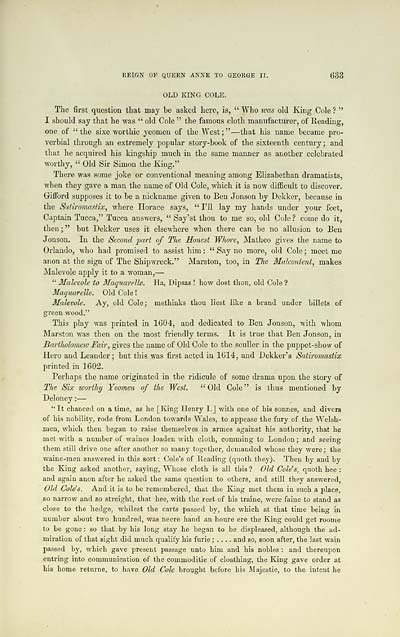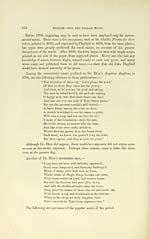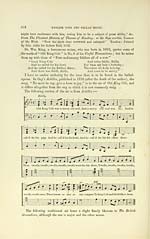Glen Collection of printed music > Printed text > Popular music of the olden time > Volume 2
(257) Page 633 - Old King Cole
Download files
Complete book:
Individual page:
Thumbnail gallery: Grid view | List view

REIGN OP QUEEN ANNE TO GEORGE II. 633
OLD KING COLE.
The first question that may be asked here, is, " Who ivas old King Cole ? "
I should say that he was " old Cole " the famous cloth manufacturer, of Reading,
one of " the sixe worthie yeomen of the West ; " — that his name became pro-
verbial through an extremely popular story-book of the sixteenth century ; and
that he acquired his kingship much in the same manner as another celebrated
worthy, " Old Sir Simon the King."
There was some joke or conventional meaning among Elizabethan dramatists,
when they gave a man the name of Old Cole, which it is now difficult to discover.
Gifford supposes it to be a nickname given to Ben Jonson by Dekker, because in
the Satiromastix, where Horace says, " I'll lay my hands under your feet,
Captain Tucca," Tucca answers, " Say'st thou to me so, old Cole ? come do it,
then;" but Dekker uses it elsewhere when there can be no allusion to Ben
Jonson. In the Second part of Tlie Honest Wiore, Matheo gives the name to
Orlando, who had promised to assist him : " Say no more, old Cole ; meet me
anon at the sign of The Shipwreck." Marston, too, in The Malcontent, makes
Malevole apply it to a woman, —
" Malevole to Maquarelle. Ha, Dipsas ! how dost thou, old Cole ?
Maquarelle. Old Cole !
Malevole. Ay, old Cole ; methiuks thou liest like a brand under billets of
green wood."
This play was printed in 1604, and dedicated to Ben Jonson, with whom
Marston was then on the most friendly terms. It is true that Ben Jonson, in
Bartholomew Fair, gives the name of Old Cole to the sculler in the puppet-show of
Hero and Leander; but this was first acted in 1614, and Dekker's Satiromastix
printed in 1602.
Perhaps the name originated in the ridicule of some drama upon the story of
The Six worthy Yeomen of the West. " Old Cole " is thus mentioned by
Deloney : —
" It chanced on a time, as he [King Henry I.] with one of his sonnes, and divers
of his nobility, rode from London towards Wales, to appease the fury of the Welsh-
men, which then began to raise themselves in amies against his authority, that he
met with a number of waines loaden with cloth, comming to London ; and seeing
them still drive one after another so many together, demanded whose they were ; the
waine-men answered in this sort : Cole's of Reading (quoth they). Then by and by
the King asked another, saying, Whose cloth is all this ? Old Cole's, quoth hee :
and again anon after he asked the same question to others, and still they answered,
Old Cole's. And it is to be remembered, that the King met them in such a place,
so narrow and so streight, that hee, with the rest of his traine, were faine to stand as
close to the hedge, whilest the carts passed by, the which at that time being in
number about two hundred, was neere hand an houre ere the King could get roome
to be gone : so that by his long stay he began to be displeased, although the ad-
miration of that sight did much qualify his furie ; . . . . and so, soon after, the last wain
passed by, which gave present passage unto him and his nobles : and thereupon
entring into communication of the commoditie of cloathing, the King gave order at
his home returne, to have Old Cole brought before his Majestie, to the intent he
OLD KING COLE.
The first question that may be asked here, is, " Who ivas old King Cole ? "
I should say that he was " old Cole " the famous cloth manufacturer, of Reading,
one of " the sixe worthie yeomen of the West ; " — that his name became pro-
verbial through an extremely popular story-book of the sixteenth century ; and
that he acquired his kingship much in the same manner as another celebrated
worthy, " Old Sir Simon the King."
There was some joke or conventional meaning among Elizabethan dramatists,
when they gave a man the name of Old Cole, which it is now difficult to discover.
Gifford supposes it to be a nickname given to Ben Jonson by Dekker, because in
the Satiromastix, where Horace says, " I'll lay my hands under your feet,
Captain Tucca," Tucca answers, " Say'st thou to me so, old Cole ? come do it,
then;" but Dekker uses it elsewhere when there can be no allusion to Ben
Jonson. In the Second part of Tlie Honest Wiore, Matheo gives the name to
Orlando, who had promised to assist him : " Say no more, old Cole ; meet me
anon at the sign of The Shipwreck." Marston, too, in The Malcontent, makes
Malevole apply it to a woman, —
" Malevole to Maquarelle. Ha, Dipsas ! how dost thou, old Cole ?
Maquarelle. Old Cole !
Malevole. Ay, old Cole ; methiuks thou liest like a brand under billets of
green wood."
This play was printed in 1604, and dedicated to Ben Jonson, with whom
Marston was then on the most friendly terms. It is true that Ben Jonson, in
Bartholomew Fair, gives the name of Old Cole to the sculler in the puppet-show of
Hero and Leander; but this was first acted in 1614, and Dekker's Satiromastix
printed in 1602.
Perhaps the name originated in the ridicule of some drama upon the story of
The Six worthy Yeomen of the West. " Old Cole " is thus mentioned by
Deloney : —
" It chanced on a time, as he [King Henry I.] with one of his sonnes, and divers
of his nobility, rode from London towards Wales, to appease the fury of the Welsh-
men, which then began to raise themselves in amies against his authority, that he
met with a number of waines loaden with cloth, comming to London ; and seeing
them still drive one after another so many together, demanded whose they were ; the
waine-men answered in this sort : Cole's of Reading (quoth they). Then by and by
the King asked another, saying, Whose cloth is all this ? Old Cole's, quoth hee :
and again anon after he asked the same question to others, and still they answered,
Old Cole's. And it is to be remembered, that the King met them in such a place,
so narrow and so streight, that hee, with the rest of his traine, were faine to stand as
close to the hedge, whilest the carts passed by, the which at that time being in
number about two hundred, was neere hand an houre ere the King could get roome
to be gone : so that by his long stay he began to be displeased, although the ad-
miration of that sight did much qualify his furie ; . . . . and so, soon after, the last wain
passed by, which gave present passage unto him and his nobles : and thereupon
entring into communication of the commoditie of cloathing, the King gave order at
his home returne, to have Old Cole brought before his Majestie, to the intent he
Set display mode to: Large image | Transcription
Images and transcriptions on this page, including medium image downloads, may be used under the Creative Commons Attribution 4.0 International Licence unless otherwise stated. ![]()
| Special collections of printed music > Glen Collection of printed music > Printed text > Popular music of the olden time > Volume 2 > (257) Page 633 - Old King Cole |
|---|
| Permanent URL | https://digital.nls.uk/91365078 |
|---|
| Shelfmark | Glen.254a |
|---|---|
| Additional NLS resources: | |
| Attribution and copyright: |
|
| Description | Scottish songs and music of the 18th and early 19th centuries, including music for the Highland bagpipe. These are selected items from the collection of John Glen (1833 to 1904). Also includes a few manuscripts, some treatises, and other books on the subject. |
|---|
| Description | The Glen Collection and the Inglis Collection represent mainly 18th and 19th century Scottish music, including Scottish songs. The collections of Berlioz and Verdi collected by bibliographer Cecil Hopkinson contain contemporary and later editions of the works of the two composers Berlioz and Verdi. |
|---|

